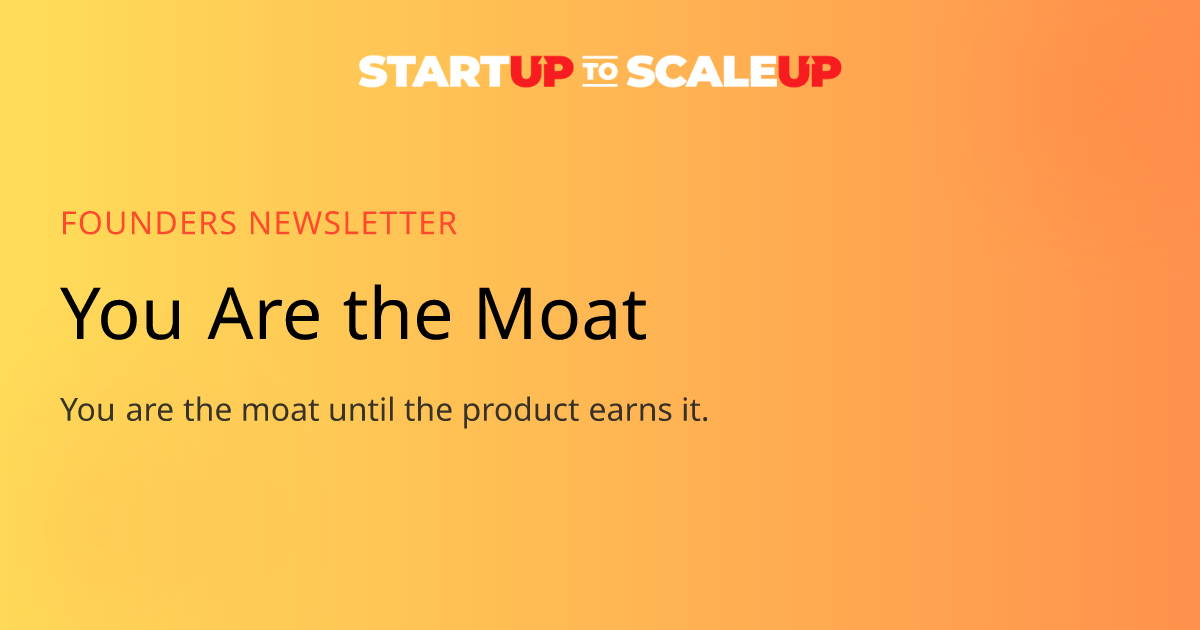Embracing Founder Mode: When to Stay in the Weeds
Published September 8, 2024
Core Takeaway
TLDR
- Conventional scaling advice suggests founders should delegate and step back, but visionaries like Brian Chesky of Airbnb demonstrate the opposite approach can work better
- True 'Founder Mode' means bringing your unique vision and passion into every decision - it's exhausting but often necessary to build something truly revolutionary
- Finding your balance on the spectrum between hands-on and delegation depends on your strengths - focus on alignment, culture, and playing to your unique abilities
Newsletter
Hey Reader,
The entire journey of trying to get your StartUp off the ground is so you can delegate something to someone else. Right? That's scalability.
Wrong. Dead wrong.
That thinking often comes from smart, experienced people who think they understand what it takes to manifest something from nothing, but they don't get that founders are a different breed.
RELATED:
First Time Founder: Ignorance On Fire
You're The Worst CEO: Founder Glow Up
Founder Evolution: ....or extinction
LETS GET INTO IT:
Paul Graham had a fire piece last week calling it "Founder Mode" that's making the rounds, giving a lot of founders the confidence to finally say it: manager mode is damaging, they want to stay in control.
The experience of one top performer with a billion-dollar company doesn't always translate to the rest of us. This isn't a "copy Chesky" playbook. It's about aligning some of his thinking with your reality, finding ways to run faster, stronger, better...on your own terms.
Most founders are already in 'Founder Mode' relentlessly revising five words on the website, obsessing over every detail, in the absolute weeds of your product and battling doubts because you're staying true to your vision.
Chesky is not alone. Jobs returning to Apple, Musk sleeping on the Tesla factory floor and countless founders you have never heard of already doing whatever it takes to make magic happen.
Founder Mode means being deep in the weeds of everything, bringing your eyes (vision) and heart (passion) into every single decision. Yes, ITB vs. RTB, yes, allocating your time where it has the most impact, yes to relentless focus. But above all, it's about absolute ownership of your sport.
It's about being the force of nature that only a true founder can be.
It's not as simple as "Founder Mode good, delegation bad."
It's also not Founder Mode = Megalomaniac Dictatorship
The Conventional Wisdom: As you scale, hire good people and get out of their way. Build a "real" company.
The "Founder Mode" Approach: Maintain direct control. Fewer things, done better. Leverage founder superpowers longer.
The Reality: It's not black and white. There's a spectrum, and where you fall depends on you, your capabilities and circumstances.
What does Founder Mode really mean?
- Being so involved that your team thinks you're crazy…until it works.
- Bringing your vision and passion into every single decision.
- Breaking "good management" rules to get your vision across.
Your deep involvement isn't a weakness. Your speed to decision making, your clarity of the market, your fight for velocity. It's your superpower. Your obsession with details isn't micromanagement. It's how you build something truly great. And non-founders can rarely deliver that on your behalf.
Is it scalable? No.
Is it exhausting? Absolutely.
Is it the only way to build something that changes a market? Probably.
But only if you can pull it off.
Founder Mode isn't for everyone. It works for exceptional founders, true pirates.
Founder Mode is not an excuse for your bullshit...
- Needlessly micromanaging every detail
- Creating a revolving door of talent
- Expecting founder-level dedication without founder-level compensation
- Getting angry when things don't go exactly your way
You're doing it wrong.
Founder Mode is about vision, passion, and execution. It's not a free pass for bad leadership. If you're using it as an excuse for toxic behavior, you're not in Founder Mode – you're just being terrible.
Real Founder Mode means taking responsibility, not shirking it. It's about elevating your team, not crushing it. It's about making hard decisions, not throwing tantrums.
If you can't tell the difference, you might not be cut out for this. Harsh, but true.
So, what does this mean for you?
- Know Yourself: Are you a visionary or do you need to build systems that empower others to act like founders?
- Align, Align, Align: Whether you're hands-on or hands-off, your primary job is alignment, everyone pulling in the same direction.
- Culture Is Real: If you can't (or shouldn't) micromanage everything, build a culture that makes the right decisions without you.
- Play To Your Strengths: If you're great at vision, do that. If you're better at brute force alignment, do that. But you must drive alignment, speed, agility, and vision somehow.
You're not here to run a company. You're here to build a brilliant company.
Just be the best founder you can be - whatever that looks like for you and your startup.
Your investors might freak out. Your team might get uncomfortable. It's part of the journey.
LFG.
-- James
Frequently Asked Questions
More Newsletters
Continue Your Founder Journey
Explore all the resources available to help you build and scale your startup
Startup Frameworks Library
Subscribe to the Newsletter
Join 140,000+ founders getting exclusive strategies, frameworks, and founder stories every Sunday.
Get instant access to the 50-Step Founder Playbook downloaded over 1M times


